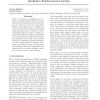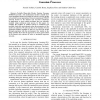81 search results - page 9 / 17 » The Optimal Reward Baseline for Gradient-Based Reinforcement... |
ATAL
2007
Springer
14 years 1 months ago
2007
Springer
This paper presents the dynamics of multiple reinforcement learning agents from an Evolutionary Game Theoretic (EGT) perspective. We provide a Replicator Dynamics model for tradit...
JAIR
2000
13 years 7 months ago
2000
This paper describes a novel method by which a spoken dialogue system can learn to choose an optimal dialogue strategy from its experience interacting with human users. The method...
ICML
2006
IEEE
14 years 8 months ago
2006
IEEE
When the transition probabilities and rewards of a Markov Decision Process are specified exactly, the problem can be solved without any interaction with the environment. When no s...
IROS
2009
IEEE
14 years 2 months ago
2009
IEEE
— Partially Observable Markov Decision Processes (POMDPs) provide a rich mathematical model to handle realworld sequential decision processes but require a known model to be solv...
AAMAS
2005
Springer
14 years 1 months ago
2005
Springer
We report on an investigation of the learning of coordination in cooperative multi-agent systems. Specifically, we study solutions that are applicable to independent agents i.e. ...


